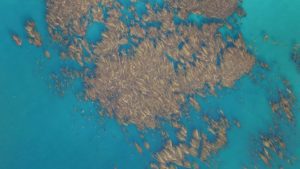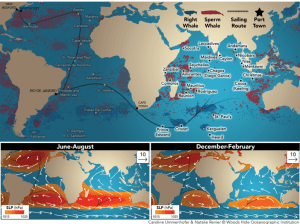UMass Dartmouth Internship Program
 Thank you for your interest in the program. The application for 2025 is now closed.
Thank you for your interest in the program. The application for 2025 is now closed.
We are offering a paid research opportunity for UMass Dartmouth students with the Woods Hole Oceanographic Institution (WHOI) January-April, 2025. Preference will be given to students who have not had an off-campus research experience in the past. Students will participate in a short course in January and begin a research project to be co-advised by a WHOI scientist and UMass Dartmouth faculty member through the spring semester.
Interns will be on-site full-time at WHOI in Woods Hole, MA, January 6-17 (weekends excluded) and March 10-14, 2025. WHOI campus housing is provided at no charge (mileage/travel allowance available if students prefer to commute). A stipend of $680/week is provided for the 3 weeks at WHOI. Stipend provided for UMassD on-campus research through the Undergraduate Research Incentive Program (URIP).
The research project will introduce interns to types of research career opportunities that exist locally, and it may serve as a stepping stone for them to consider graduate studies. Research project options for Winter/Spring 2025 are listed below - additional projects coming soon!
The short course will be 2 hours/day, Tues-Fri, Jan 7-10 and 14-17, including lectures and hands-on activities related to WHOI research on Blue Economy topics such as ocean aquaculture, offshore wind energy, harmful algal blooms, engineering and sensor development, and degradation of organic pollutants. The course will be taught in the Autonomous Vehicles and Sensor Technologies (AVAST) facility.
The application for 2025 is closed.
1. On-line Application Form - includes contact and academic information, and short answer questions about your educational/career goals and research interests
2. Unofficial Transcript - email to education@whoi.edu
3. Resume (pdf or doc) - email to education@whoi.edu
4. One Reference is required from a professor/instructor who knows you in an academic capacity. A second reference is optional from a job supervisor, another instructor, or another supervisor.
Instructions to send to reference letter writers are here.
If you have any questions about the program or the application, please contact education@whoi.edu
Below are research project options for UMass Dartmouth interns for Winter/Spring 2025:
Marine Foundation Species and Climate Change Solutions
Tom Bell (WHOI) and TBD (UMASSD)
Read more

Giant kelp canopy showing fronds with varying physiological condition. Lighter colored senescent fronds contain less chlorophyll pigment and are generally older than darker frond with higher chlorophyll content. (Tom Bell, © Woods Hole Oceanographic Institution)
Marine foundation species (e.g., kelp forests, coral reefs, seagrass meadows, saltmarshes) structure entire communities, which are often ecologically and economically important, by creating physical habitat and enhancing productivity. Fundamental and applied research that quantifies how a changing environment interacts with marine foundation species can lead to a greater understanding of ecology and promote beneficial human outcomes.
The Bell lab at WHOI (Applied Ocean Physics and Engineering Dept.) focuses its research on macroalgal forests (kelp forests), salt marshes, and coral reefs and is motivated by understanding how the physical environment and intrinsic biotic factors drive the population and physiological dynamics of foundation species over local to global scales. Recently, there has been great interest in understanding how these systems can be leveraged to remove carbon dioxide from the atmosphere and sequester fixed carbon in the deep ocean.
We are seeking a student interested in pursuing a research project focused on one of two areas:
- Investigate the optimal siting of large-scale kelp aquaculture to enhance atmospheric carbon dioxide removal and sequestration in the deep sea. This marine spatial planning project would involve maximizing kelp production, reducing distance to sequestration sites, and minimizing existing human conflicts.
- Mapping the distribution and health of local salt marsh and/or intertidal species using a variety of drone-based sensors and determining appropriate spectral classification methodologies.
In-Water Validation of Sound Pressure Level Estimates for Underwater Cognitive Router Applications
Colin Ryan/Acoustic Communications Group (WHOI) and John Buck (UMASSD)
Read more
To operate safely and effectively, Autonomous Underwater Vehicles (AUVs) rely on acoustic communication networks. The reliability of the underwater acoustic communication system is difficult to predict ahead of time due a combination of time varying environmental and geometric variables.
During this project, the student(s) will assist in making a series of high-fidelity, calibrated acoustic measurements in WHOI tanks and from the dock. These measurements will be compared against the sound pressure level (SPL) estimated on a low-power acoustic receiver that is already on the underwater robot. Knowing the in-water SPL at various nodes in the communication network allows the system to learn about and adapt to its environment. The communication network is then optimized for reliable data transfer with minimal power usage. These features are critical when operating battery-powered AUVs in harsh, real-world environments.
Data analysis will be completed using MATLAB. Familiarity with signal processing and/or acoustics is desired.
Quantifying the Economic Implications of Aging Wastewater Infrastructure for the Commercial Shellfish Industry in Buzzards Bay, MA
Michael Weir, Marine Policy Center (WHOI) and TBD (UMASSD)
Read more
Buzzards Bay supports a vibrant shellfish community that also grapples with water contamination events related to aging municipal wastewater infrastructure, particularly that of New Bedford. Contamination events linked to aging infrastructure result in shellfish harvest closures impacting the shellfish industry and shoreside businesses that work closely with the harvest sector.
This project will estimate the regional economic impact of recent shellfish bed closures in Buzzards Bay and explore the implications of delaying wastewater infrastructure improvements. Analyses will be completed using R and the Microsoft suite.
Extracting Maritime Weather Data from 19th Century New England Whaling Ship Logbooks
Caroline Ummenhofer (WHOI) and Timothy Walker (UMASSD)
Read more
Caroline Ummenhofer, Department of Physical Oceanography, Climate science

(Top) Map of whale captures for right and sperm whales from New England whaling ships, highlighting voyages to the Indian Ocean. (Bottom) Shifting seasonal pressure and wind patterns that were exploited for the outbound/inbound journeys.
Ummenhofer’s group focuses on ocean-atmosphere interactions, variability and change across different components of the climate system, and the resulting regional impacts. The group aims to develop an understanding of the underlying mechanisms of the ocean’s role in regional climate and how that information could be useful for tackling problems of societal relevance. It addresses rainfall variability and extreme events, such as droughts and storms, across a range of scales: from individual synoptic events to interannual, decadal variability and beyond. Research involves both present-day climate conditions, variability over past centuries, as well as future changes in a warming world.
Project: Extracting maritime weather data from 19th century New England whaling ship logbooks
In climate research, long datasets are invaluable. They help establish a climate baseline against which to measure recent changes, illuminate connections between different aspects of the climate system, and validate climate models. Yet, pre-19th century instrumental data from regions beyond Europe and North America are sparse. A growing field of scholarship addresses this gap by interpreting historical records. One of the richest troves of maritime weather data is contained in the vast archives of ship logs, in which officers routinely recorded weather observations during their voyages. The logbooks contain systematic weather observations (e.g., wind strength/direction, precipitation, cloud cover).
Led by Caroline Ummenhofer, a climate scientist at WHOI, and Timothy Walker, a historian of maritime and colonial history at UMASSD, the project is interdisciplinary in nature. Archival research, data gathering, and data entry as part of a larger research project will involve the following tasks: Reading and extracting data from historical documents (manuscripts), namely whaling ship logbooks held at the New Bedford Whaling Museum and the New Bedford Free Public Library. The historical data gathering involves reading and extracting weather and contextual data from these unique historical documents covering the period 1790-1860. All logbooks are original manuscripts, so skills needed are the ability to read and interpret archaic handwriting (paleography), as well as a basic knowledge of age-of-sail nautical terminology. Relevant weather and contextual data will be entered into an online purpose-built database via personal laptop. Archival training will be done in person at the New Bedford Whaling Museum.
Required skills:
- interest in maritime history;
- paleography skills and familiarity with maritime/nautical terminology;
- desirable: experience with data entry and database management.
By the end of the project, the successful applicant will have
- gained experience in paleography, archival research methods, and historical data entry;
- gained an understanding of global wind and pressure patterns and their utility for shipping and trade;
- gained practical knowledge in quality control, data processing, and database management for historical ship-based weather recordings;
- gained hands-on experience in working with historical ship logbook information in an interdisciplinary context.
Select weblinks of related project coverage
- https://ummenhofer.whoi.edu/historical-records/
- https://www.wpri.com/dont-miss/whaling-log-books-from-local-voyages-help-researchers-study-climate-change/
- https://www.smithsonianmag.com/science-nature/how-a-trove-of-whaling-logbooks-will-help-scientists-understand-our-changing-climate-180984424/
- https://www.cbsnews.com/boston/news/new-bedford-whaling-museum-logbooks-climate-weather-science/
- https://www.whoi.edu/news-insights/content/mining-climate-clues-from-our-whaling-past/
Groundwater - Surface Water Exchange in Salt Marshes
Rob Sohn (WHOI) and TBD (UMASSD)
Read more
